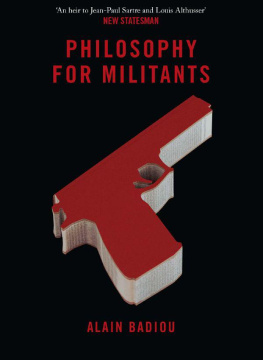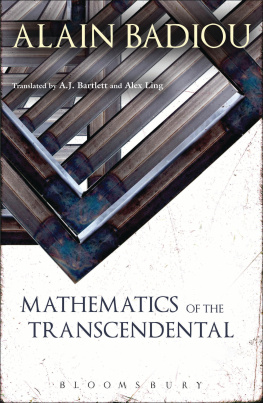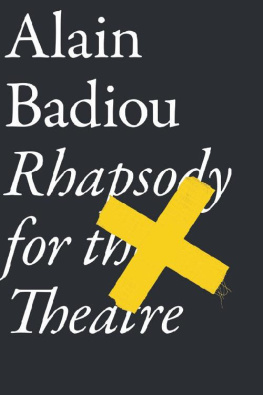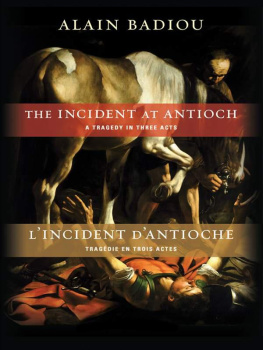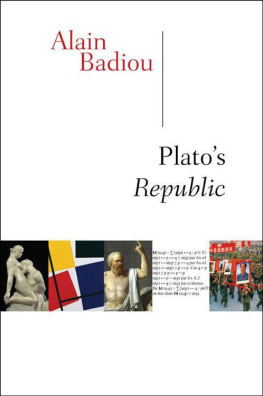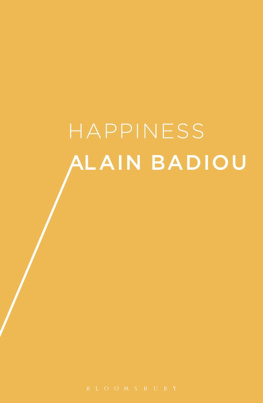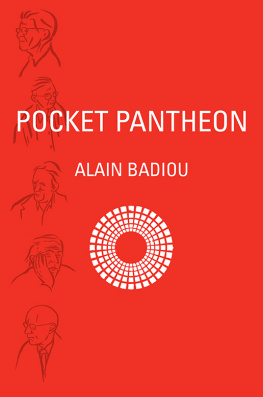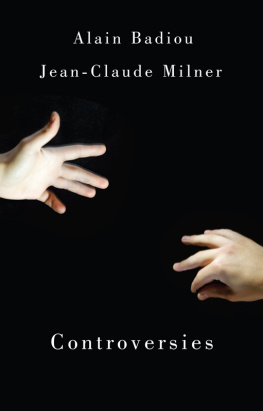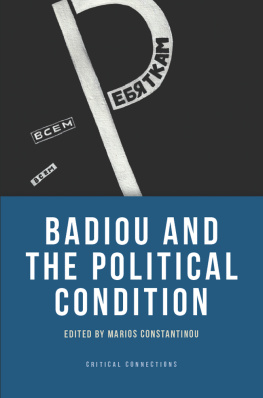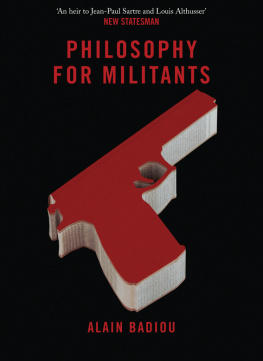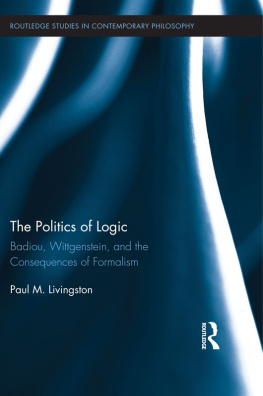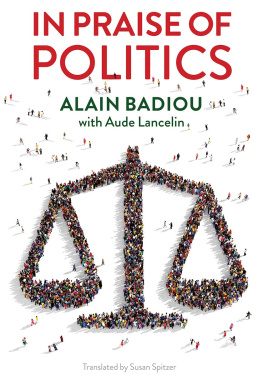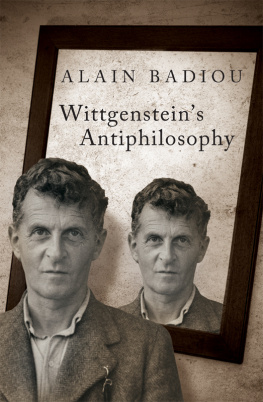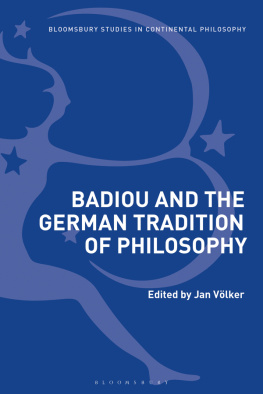Philosophy for Militants
ALAIN BADIOU
Translated with a foreword by Bruno Bosteels

Contents
W hat better way to preface this charming set of talks on the relationship between politics and philosophy than by asking to what extent they meet the challenge of providing a philosophy for militants, as the title of the English translation would indicate? In fact, being a clever marketing ploy on the part of the publisher, this title at first did not sit well with the author even though he also confessed that he could not come up with a more appropriate one either. This is because Alain Badious entire oeuvre can be said to lead to the conclusion that philosophy cannot, or should not, provide political activists and militants with an answer to that classical question: What is to be done?
Regardless of whether Lenin had this view in mind when he famously borrowed the phrasing of that question from Nikolai Chernyshevsky, there certainly exists a common view according to which the task of the philosopher as an intellectual would consist in telling the masses what is to be done. Even Badiou himself, in the preface to his Theory of the Subject published forty years ago, may seem to have been seduced by this self-serving image of the philosopher, insofar as he quotes the people on the barricades during the Paris Commune, in the words of Julien Gracq, as crying out for orders that presumably ought to be forthcoming from the intellectuals: Where are the orders? Where is the plan? In fact, part of this new vicinity or topology will involve a growing awareness of the fact that philosophy cannot and should not be programmatic in the classical sense of providing workers and militants with orders for what is to be done.
Already in the context of his next major work, Being and Event , Badiou shows much more reluctance before becoming prescriptive in that older sense. In this regard, an interesting but little-known piece of anecdotal evidence is worth developing in some detail. Indeed, when, as part of his investigations for Being and Event , Badiou took up the question of deciding whether the factory still represented a strategic site for political struggles today, and thus whether the traditional Marxist paradigm for thinking of politics could still be applicable, his conclusion on the one hand seemed to be resoundingly affirmative, even to the point of becoming openly prescriptive. Thus, Badiou first attempts to define the essence of Marxism: Reduced to its bare bones, Marxism is jointly the hypothesis of a politics of non-domination a politics subtracted from the count of the State and the designation of the most significant event sites of modernity, those whose singularity is maximal, which are worker sites. The strength of the classical Marxist paradigm, in other words, would be both political and analytical. In fact, the difficulty consists precisely in coming to terms with the fact that the analytical element is conditioned by the retroactive effect of actual political interventions without allowing the latter to be derived directly or necessarily from the former. Badiou also writes:
Now, I maintain that this is what Marx was the first to perceive, at a time when factories were in fact seldom counted in the general historical presentation. The vast analytic constructions of Capital are the retroactive foundation of what for him was a pre-predicative evidence: that modern politics could not be formulated, even as a hypothesis, otherwise than by proposing an interpretation-in-subject of these astounding hysterias of the social in which workers named the hidden void of the capitalist situation, by naming their own unpresentation.
This insight into the double gesture of Marxism as both analytic construction and political intervention, finally, explains why Badiou, even in the context of Being and Event , can appear to remain prescriptive by concluding that the hypothesis of an emancipatory politics today must continue to anchor itself in the reference to the workers in the factory as a key site if not the only one of all possible political events: That is the reason why it remains legitimate to call oneself a Marxist, if one maintains that politics is possible.
On the other hand, however, Badiou in the end decided not to publish these reflections as part of Being and Event . Instead, he reserved them exclusively for Le Perroquet , which was the newsletter of his political organisation at the time. In part, his reasons for doing so were simply logistical. Indeed, Badiou had originally foreseen many more meditations than the thirty-seven that now make up Being and Event with exemplifying illustrations for each of the four conditions of philosophy, which are politics, art, science and love. This turned out to be physically and conceptually unmanageable. But, all logistics aside, there was also an important methodological reason for omitting the few pages of The Factory as Event Site from the vast philosophical system that is Being and Event . That is to say, as Badiou himself explains in an introductory note written for Le Perroquet , by excluding those pages he is also trying to avoid the traditional role of philosophy as the mother of all discourses, capable of setting the agenda for politics. I have withdrawn them, together with others, writes Badiou about the pages in question, in order to avoid any false perceptions of the kind: politics is the daughter to philosophy. Because it is the opposite that is true. Philosophy as Hegel but already Plato knew full well stands under the condition of procedures of thought that are external to it, among which we find, at the very least, science, art and politics.
For Badiou, in other words, philosophy cannot and should not play any hegemonic role over politics, for the simple reason that it is rather philosophy which is always conditioned, whether knowingly or not, by actually existing forms of politics, science and so on. More broadly speaking, philosophy is incapable of producing any events or truths of its own, be they political or otherwise. Instead, philosophy is conditioned by events that are not its own making. This also means, incidentally, that all the talk about the Badiou event in philosophy, and about the fidelity of certain commentators to this event, is purely nonsensical. Such talk is strictly incompatible with one of the basic principles behind Badious own philosophy, according to which events happen only in other, nonphilosophical domains such as art or politics, the primacy of which constitutes a fundamental premise behind the materialist orientation of this philosophy, as opposed to the typically idealist orientation of philosophies bent upon engendering their truth content out of the activity of the pure concept.
However, Philosophy for Militants, while clearly running counter to certain basic assumptions behind Badious philosophy, is not a complete misnomer either. To this day, indeed, Badiou has never given up on the idea that philosophy can and must be at the service, if not of the people, as he would have said during his Maoist years, then at least of the few practical truths of which human beings occasionally are capable. A philosophy worthy of the name that which begins with Parmenides is in any case antinomical to the service of goods, inasmuch as it endeavours to be at the service of truths, because it is always possible to endeavour to be at the service of something that one does not constitute oneself, Badiou postulates in Being and Event , once more confirming the primacy of practical truths over philosophy, but now adding the useful subservience of philosophy to such truths: Philosophy is thus at the service of art, of science and of politics. Whether it is also capable of being at the service of love is more doubtful (art, on the other hand, as a mixed procedure, supports the truths of love).
Next page
